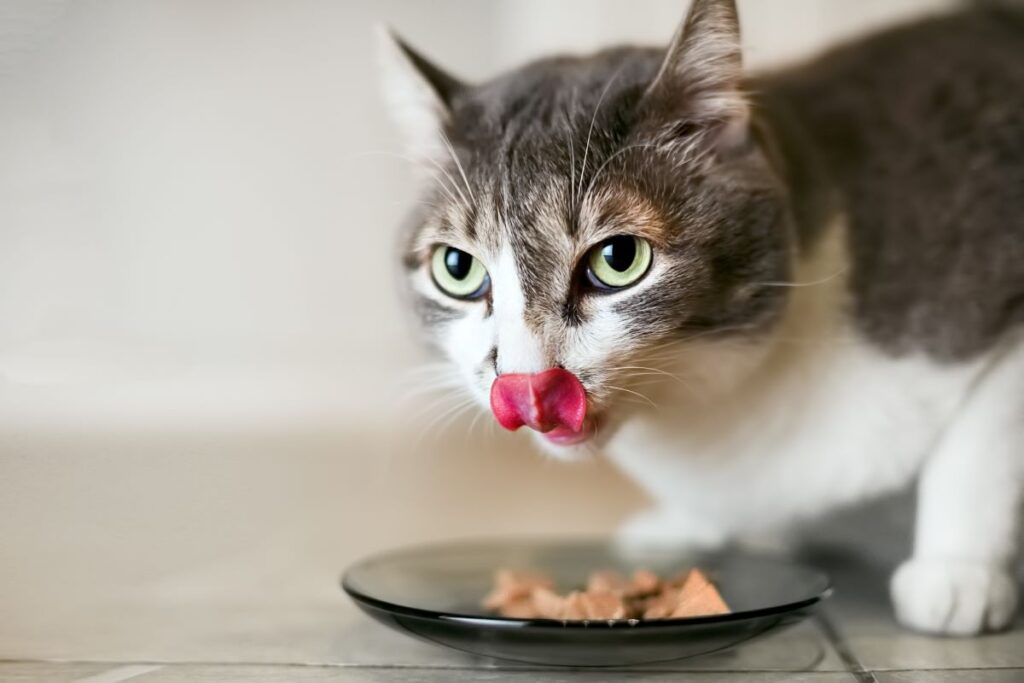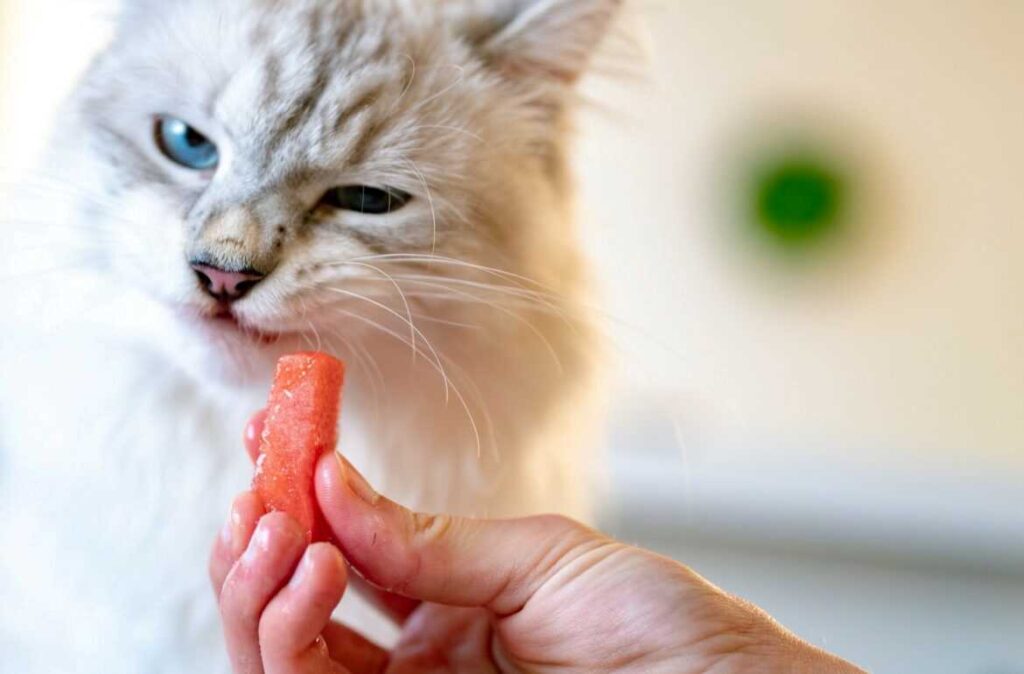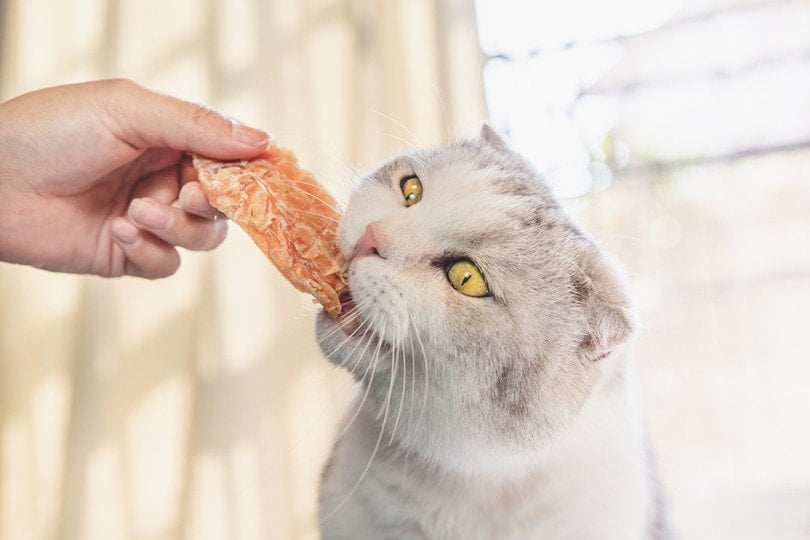Can Cats Eat Raw CatFish – Everything You Need to Know

Ever wondered if it’s alright to give your cat some raw catfish? The big question here is, Can cats eat raw catfish? This inquiry taps into the world of cat nutrition, especially with the increasing interest in giving cats raw food.
As more pet owners explore different food options, the idea of adding raw catfish to a cat’s diet is gaining attention. In this guide, we’re going to explore the basics of what cats need to eat, the growing trend of giving them raw food, and the good and not-so-good aspects of serving up raw catfish.
Can I Feed My Cat Raw Catfish?
Yes, you can feed your cat raw catfish. However, it comes with considerations. Raw catfish can be a source of high-quality protein, essential for your cat’s muscle development. but there are potential risks that require attention.
Raw fish carries the risk of bacterial contamination, which can be harmful to both your cat and yourself. Parasites present in raw fish are another concern. While freezing the catfish may reduce the risk of parasites, it doesn’t eliminate all potential hazards.
Additionally, a diet solely based on raw catfish may lead to nutritional imbalances, as it might lack essential nutrients necessary for your cat’s overall health. Before introducing raw catfish into your cat’s diet, consult with your veterinarian to ensure a safe and balanced approach that meets your cat’s specific nutritional needs.
Advantages of Feeding Cats Raw CatFish

Feeding your cat raw catfish can offer several advantages, making it a viable consideration for feline nutrition:
1. Nutrient-Rich Profile: Raw catfish is a nutrient-dense protein source, containing essential amino acids crucial for a cat’s overall health. It provides a natural boost of vitamins and minerals, contributing to their vitality.
2. Omega-3 Fatty Acids: Catfish is particularly rich in omega-3 fatty acids, promoting a healthy coat, skin, and supporting cognitive functions. This can be especially beneficial for cats with skin conditions or those requiring additional cognitive support.
3. Improved Hydration: Raw catfish has a high moisture content, aiding in hydration. Cats are notoriously low water drinkers, and incorporating moisture-rich foods into their diet can contribute to better overall hydration levels.
4. Dental Health: Chewing on raw catfish may help maintain dental health. The gnawing action assists in reducing tartar and plaque buildup, supporting optimal oral hygiene.
5. Potential Allergen Variability: For cats with specific food sensitivities, introducing raw catfish provides an alternative protein source, potentially alleviating allergic reactions associated with other common proteins in commercial cat foods.
While considering these advantages, it’s essential to approach the introduction of raw catfish cautiously, considering individual cat preferences, potential allergies, and consulting with a veterinarian to ensure a well-balanced and tailored diet.
Understanding Cats’ Dietary Requirements
Understanding what our pet cat’s need in their diet is crucial for keeping them healthy. Cats are meat lovers, so their food should be rich in good-quality proteins. These proteins help with things like muscle growth and overall health. Important stuff like taurine and fatty acids are also needed for a shiny coat and overall well-being.
Even though our pet cats live with us, they still have that wild side that loves a diet packed with meat. Whether you choose store-bought cat food or something more natural, the key is to make sure it has the right stuff in it. So, next time you’re picking out cat food, think about those essential nutrients that keep your cat happy and healthy. It’s all about giving them the kind of food that suits their natural cravings.
Do Cats Like to Eat Catfish?
The culinary preferences of cats can often spark curiosity, leading to the question: do cats enjoy indulging in catfish? Cats are known for their discerning palates, and while individual tastes may vary, catfish tends to be a hit with many. Its meaty texture and distinctive flavor often appeal to cats, aligning with their carnivorous instincts.
Rich in protein and omega-3 fatty acids, catfish offers potential nutritional benefits for cats, contributing to their overall well-being. Some cat owners report that their feline companions relish catfish, either cooked or raw. However, as with any dietary choice, moderation and consideration of the cat’s individual preferences are key.
Observing your cat’s reaction to catfish can provide insights into their culinary inclinations. While not every cat may fancy this aquatic delight, catfish stands as a palatable option for those seeking to diversify their feline friend’s menu.
Nutritional Content of Catfish

Catfish is known to be high in nutritional content that can prove to be quite healthy for pet cats:
- Protein Powerhouse: Catfish is a robust source of high-quality protein, essential for muscle development and overall feline health.
- Omega-3 Fatty Acids: Rich in omega-3 fatty acids, catfish contributes to a glossy coat, healthy skin, and supports cognitive functions in cats.
- Vitamins and Minerals: Catfish contains vital vitamins and minerals, including B vitamins, phosphorus, and selenium, fostering a well-rounded nutritional profile.
- Low in Saturated Fat: Compared to other meats, catfish is relatively low in saturated fat, making it a lean protein option for cats.
- Energy Boost: The nutrient composition of catfish provides a valuable energy source for cats, aiding in their daily activities.
- Palatability for Cats: Many cats find catfish palatable, making it an enticing option to incorporate into their diet and encourage regular eating.
Understanding the nutritional content of catfish underscores its potential as a wholesome addition to a cat’s diet, offering a mix of essential nutrients vital for their overall health and vitality.
Risks and Concerns
Here are some risks and concerns to look out for when feeding your cat raw catfish:
- Raw Diets Caution: Be aware of potential bacterial contamination in raw diets, posing risks to both cats and humans.
- Nutritional Imbalances: Diverse diets may inadvertently lead to imbalances, emphasizing the importance of providing proper nutrients in suitable proportions.
- Allergic Sensitivities: Like humans, cats can develop sensitivities or allergies to certain foods. Monitor for adverse reactions and consult with a vet if needed.
- Digestive Upset: Abrupt changes in diet, especially introducing new foods, can cause digestive upset. Opt for gradual transitions and observe for any issues.
- Consulting with Veterinarians: Seek professional advice from veterinarians to ensure a safe and well-informed approach to meeting your cat’s nutritional needs.
Safe Preparation and Handling
Ensuring the safe preparation and handling of catfish is crucial when introducing it into your cat’s diet. Start by prioritizing freshness—opt for catfish with a clean, ocean-like scent to guarantee maximum nutritional benefits. Thorough cooking is paramount to eliminate potential harmful bacteria, not only safeguarding your cat’s health but also enhancing the digestibility of essential nutrients.
It’s crucial to refrain from adding seasonings, spices, or additives during preparation, as cats can be sensitive to certain ingredients that may upset their stomachs or pose toxicity risks. Maintaining simplicity and naturalness in the preparation process ensures a safer and more enjoyable dining experience for your feline friend. Regular consultation with your veterinarian provides personalized guidance on incorporating catfish into your cat’s diet, aligning with their health and nutritional needs.
Conclusion
In conclusion, while catfish can be a tasty and nutritious addition to your cat’s diet, safe handling and preparation are key. Opt for fresh catfish, cook it thoroughly, and avoid adding any seasonings or additives. Keeping it simple ensures a safer and more enjoyable dining experience for your pet.
By approaching catfish with care and consideration, you can offer your cat a delicious treat that contributes positively to their overall well-being.
Additional Resources
Here are some more articles you can read to help you enhance your cat’s diet:


